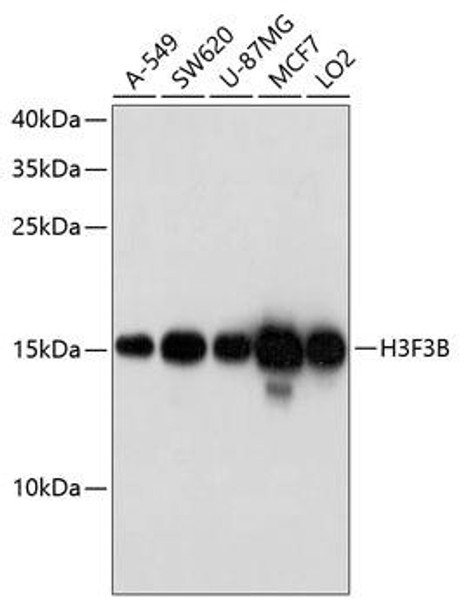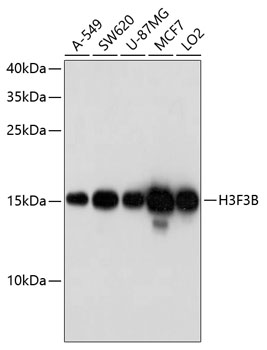Anti-H3F3B Antibody (CAB10220)
- SKU:
- CAB10220
- Product type:
- Antibody
- Reactivity:
- Human
- Host Species:
- Rabbit
- Isotype:
- IgG
- Antibody Type:
- Polyclonal Antibody
- Research Area:
- Cell Biology
Frequently bought together:
Description
| 抗体名: | Anti-H3F3B Antibody |
| 抗体コード: | CAB10220 |
| 抗体サイズ: | 20uL, 50uL, 100uL |
| 申し込み: | WB IF |
| 反応性: | Human |
| 宿主種: | Rabbit |
| 免疫原: | Recombinant fusion protein containing a sequence corresponding to amino acids 1-136 of human H3F3B (NP_002098.1). |
| 申し込み: | WB IF |
| 推奨希釈: | WB 1:500 - 1:2000 IF 1:50 - 1:200 |
| 反応性: | Human |
| ポジティブサンプル: | A-549, SW620, U-87MG, MCF7, LO2 |
| 免疫原: | Recombinant fusion protein containing a sequence corresponding to amino acids 1-136 of human H3F3B (NP_002098.1). |
| 精製方法: | Affinity purification |
| ストレージバッファ: | Store at -20'C. Avoid freeze / thaw cycles. Buffer: PBS with 0.02% sodium azide, 50% glycerol, pH7.3. |
| アイソタイプ: | IgG |
| 順序: | MART KQTA RKST GGKA PRKQ LATK AARK SAPS TGGV KKPH RYRP GTVA LREI RRYQ KSTE LLIR KLPF QRLV REIA QDFK TDLR FQSA AIGA LQEA SEAY LVGL FEDT NLCA IHAK RVTI MPKD IQLA RRIR GERA |
| 遺伝子ID: | 3021 |
| Uniprot: | P84243 |
| セルラーロケーション: | Chromosome, Nucleus |
| 計算された分子量: | 15kDa |
| 観察された分子量: | 15kDa |
| 同義語: | H3F3B, H3.3B |
| バックグラウンド: | Histones are basic nuclear proteins that are responsible for the nucleosome structure of the chromosomal fiber in eukaryotes. Two molecules of each of the four core histones (H2A, H2B, H3, and H4) form an octamer, around which approximately 146 bp of DNA is wrapped in repeating units, called nucleosomes. The linker histone, H1, interacts with linker DNA between nucleosomes and functions in the compaction of chromatin into higher order structures. This gene contains introns and its mRNA is polyadenylated, unlike most histone genes. The protein encoded by this gene is a replication-independent histone that is a member of the histone H3 family. Pseudogenes of this gene have been identified on the X chromosome, and on chromosomes 5, 13 and 17. |
| UniProt Protein Function: | H3F3A: Variant histone H3 which replaces conventional H3 in a wide range of nucleosomes in active genes. Constitutes the predominant form of histone H3 in non-dividing cells and is incorporated into chromatin independently of DNA synthesis. Deposited at sites of nucleosomal displacement throughout transcribed genes, suggesting that it represents an epigenetic imprint of transcriptionally active chromatin. Nucleosomes wrap and compact DNA into chromatin, limiting DNA accessibility to the cellular machineries which require DNA as a template. Histones thereby play a central role in transcription regulation, DNA repair, DNA replication and chromosomal stability. DNA accessibility is regulated via a complex set of post-translational modifications of histones, also called histone code, and nucleosome remodeling. The nucleosome is a histone octamer containing two molecules each of H2A, H2B, H3 and H4 assembled in one H3-H4 heterotetramer and two H2A-H2B heterodimers. The octamer wraps approximately 147 bp of DNA. Interacts with HIRA, a chaperone required for its incorporation into nucleosomes. Belongs to the histone H3 family. |
| UniProt Protein Details: | Protein type:DNA-binding Chromosomal Location of Human Ortholog: 1q42.12 Cellular Component: extracellular region; nuclear chromosome; nuclear chromosome, telomeric region; nucleoplasm; nucleosome; nucleus; protein complex Molecular Function:histone binding; nucleosomal DNA binding; protein binding Biological Process: blood coagulation; cellular protein metabolic process; chromatin silencing at rDNA; DNA replication-independent nucleosome assembly; negative regulation of gene expression, epigenetic; nucleosome assembly; positive regulation of cell growth; positive regulation of gene expression, epigenetic; RNA-mediated gene silencing; telomere organization and biogenesis |
| NCBI Summary: | Histones are basic nuclear proteins that are responsible for the nucleosome structure of the chromosomal fiber in eukaryotes. Two molecules of each of the four core histones (H2A, H2B, H3, and H4) form an octamer, around which approximately 146 bp of DNA is wrapped in repeating units, called nucleosomes. The linker histone, H1, interacts with linker DNA between nucleosomes and functions in the compaction of chromatin into higher order structures. This gene contains introns and its mRNA is polyadenylated, unlike most histone genes. The protein encoded by this gene is a replication-independent histone that is a member of the histone H3 family. Pseudogenes of this gene have been identified on the X chromosome, and on chromosomes 5, 13 and 17. [provided by RefSeq, Oct 2015] |
| UniProt Code: | P84243 |
| NCBI GenInfo Identifier: | 55977062 |
| NCBI Gene ID: | 3021 |
| NCBI Accession: | P84243.2 |
| UniProt Secondary Accession: | P84243,P06351, P33155, Q5VV55, Q5VV56, Q66I33, Q9V3W4 |
| UniProt Related Accession: | P84243 |
| Molecular Weight: | 15,328 Da |
| NCBI Full Name: | Histone H3.3 |
| NCBI Synonym Full Names: | H3 histone, family 3B |
| NCBI Official Symbol: | H3F3B |
| NCBI Official Synonym Symbols: | H3.3B |
| NCBI Protein Information: | histone H3.3 |
| UniProt Protein Name: | Histone H3.3 |
| UniProt Gene Name: | H3F3A |
| UniProt Entry Name: | H33_HUMAN |
View AllClose


